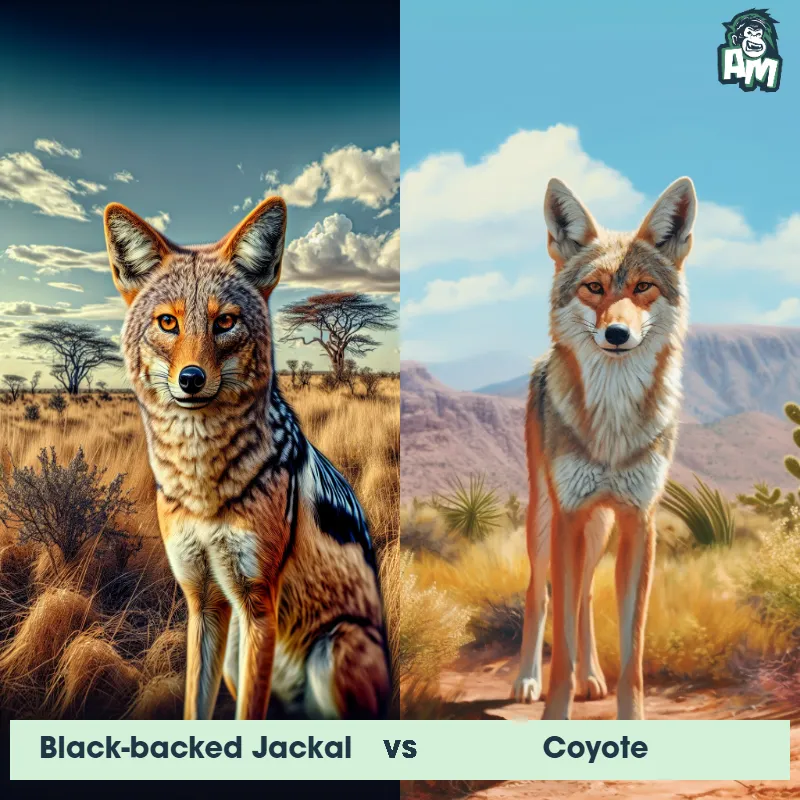The Black-Backed Jackal
The Black-Backed Jackal, scientifically known as Canis mesomelas, is a medium-sized carnivore native to the African continent. They have a distinctive appearance, characterized by a slender body, long legs, and a bushy tail. Their fur varies in color, ranging from pale yellowish-brown to reddish-brown, with a black saddle-like patch on their back, which gives them their name. One of their most notable features is their pointed ears, which are proportionally large and erect. Black-Backed Jackals are highly adaptable and can thrive in various habitats, including savannas, deserts, and open woodlands.

| Black-Backed Jackal | |
|---|---|
| Size | 15–19 inches at the shoulder (38-48 cm) |
| Weight | Up to 35 pounds (16 kg) |
| Speed | 40 mph (64 km/h) |
| Key Strength | Agile and fast movements, sharp teeth and claws |
| Biggest Weakness | Not as strong as larger predators, relies on speed and agility |
| Scientific Name | Canis mesomelas |
| Family | Canidae |
| Habitat | Grasslands, savannas, deserts, woodland areas |
| Geography | Native to Africa |
| Diet | Opportunistic feeders, consume small and medium-sized prey, fruits, insects, and carrion |
| Lifespan | 8 years - 10 years |

The Black-Backed Jackal
The Black-Backed Jackal, scientifically known as Canis mesomelas, is a medium-sized carnivore native to the African continent. They have a distinctive appearance, characterized by a slender body, long legs, and a bushy tail. Their fur varies in color, ranging from pale yellowish-brown to reddish-brown, with a black saddle-like patch on their back, which gives them their name. One of their most notable features is their pointed ears, which are proportionally large and erect. Black-Backed Jackals are highly adaptable and can thrive in various habitats, including savannas, deserts, and open woodlands.
Fun Fact: Contrary to popular belief, Black-Backed Jackals are not actually dogs but belong to the same canid family that includes wolves and foxes.
| Black-Backed Jackal | |
|---|---|
| Size | 15–19 inches at the shoulder (38-48 cm) |
| Weight | Up to 35 pounds (16 kg) |
| Speed | 40 mph (64 km/h) |
| Key Strength | Agile and fast movements, sharp teeth and claws |
| Biggest Weakness | Not as strong as larger predators, relies on speed and agility |
| Scientific Name | Canis mesomelas |
| Family | Canidae |
| Habitat | Grasslands, savannas, deserts, woodland areas |
| Geography | Native to Africa |
| Diet | Opportunistic feeders, consume small and medium-sized prey, fruits, insects, and carrion |
| Lifespan | 8 years - 10 years |
Black-Backed Jackal Matchups
We use AI to simulate matchups between the Black-Backed Jackal and other animals. Our simulation considers size, strength, and natural predatory behaviors to determine the most likely outcome.

Can't find the Matchup you want?
Create Your Own MatchupBlack-Backed Jackal: Diet, Predators, Aggression, and Defensive Behaviors
What do Black-Backed Jackals eat?
Black-Backed Jackals are omnivorous animals, with a diet that primarily consists of small mammals, birds, reptiles, insects, fruits, and carrion. They are skilled hunters, but also scavenge for food, making them opportunistic feeders.
Do Black-Backed Jackals have any predators?
Although they are generally considered apex predators in their ecosystems, Black-Backed Jackals do have some predators to watch out for. Larger carnivores such as leopards, hyenas, and African wild dogs may pose a threat to them, especially to younger or weaker individuals.
Are Black-Backed Jackals aggressive?
Black-Backed Jackals are not typically aggressive towards humans, but they can display aggression towards other animals, especially when defending their territory or offspring. They are known to be territorial and may engage in confrontations with intruders.
Do Black-Backed Jackals fight?
Black-Backed Jackals are known to engage in fights with rival jackals or other predators, especially when it comes to defending their territory, food sources, or young. These fights can become intense and may involve biting, growling, and chasing.
How do Black-Backed Jackals defend themselves?
When faced with threats or predators, Black-Backed Jackals have a few defense mechanisms to protect themselves. They may rely on their speed and agility to evade danger, as well as their sharp teeth and vocalizations to intimidate or fend off attackers.
What is the biggest weakness of Black-Backed Jackals in a fight?
Despite their agility and sharp teeth, Black-Backed Jackals are relatively small in size compared to some of their predators. This makes them vulnerable in physical confrontations with larger carnivores, as they may struggle to overpower or defend themselves against stronger opponents.
Fun Fact: These jackals are known for their keen sense of hearing and excellent vocalization abilities, often emitting a wide range of distinct calls that include howls, yelps, and barks to communicate with other members of their pack.
Fun Fact: Black-Backed Jackals are opportunistic scavengers and skillful hunters, but they also possess a clever tactic called "mobbing," in which they harass and distract larger predators, such as lions or hyenas, to steal their kills. This tactic allows them to scavenge food without having to take on direct confrontation.











